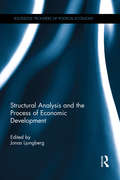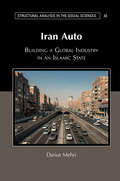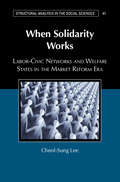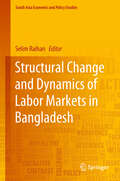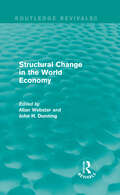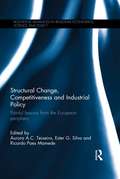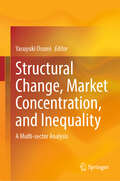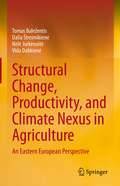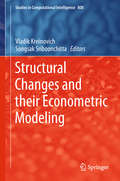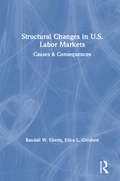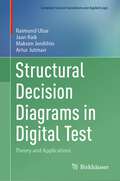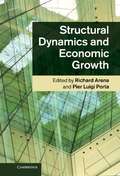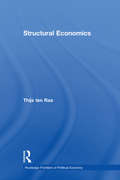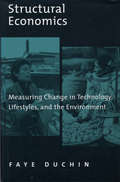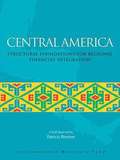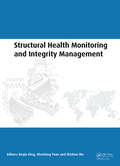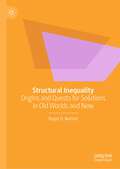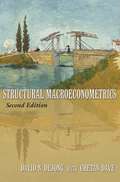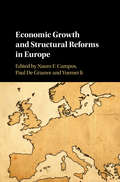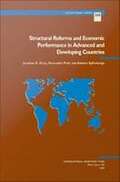- Table View
- List View
Structural Analysis and the Process of Economic Development (Routledge Frontiers of Political Economy)
by Jonas LjungbergEconomic development is full of discontinuities. Mainstream economists perceive these as external disturbances to a natural state of equilibrium, but this book argues that much of the discontinuities are part of economic development, suggesting that patterns can be understood with structural analysis. Structural Analysis and the Process of Economic Development presents a detailed analysis of the trajectory of Swedish economic change since the nineteenth century. The emergence of structural analysis in economic research is reviewed, as well as a chapter devoted to development blocks, a key concept that was outlined in the 1940s and that has much in common with the more recent notions ‘techno-economic paradigms’ and ‘general-purpose technologies’. Structural analysis and the major contributions by Schön are introduced in this book. Also highlighted is Sweden’s integration into the international economy via the nineteenth century capital markets, along with structural analysis as a tool for understanding climate change. The recent technique of wavelet analysis and its potential for structural analysis is demonstrated in a non-technical chapter. This book is suitable for those who are interested in and study political economy, economic history and European history.
Structural Analysis in the Social Sciences: Building a Global Industry in an Islamic State (Structural Analysis in the Social Sciences #43)
by Darius MehriSince the revolution of 1979, scholars have portrayed the Islamic State's industrial development capacity in a negative light. Global isolation, incoherent economic planning, and predatory Islamic institutions are often cited as the reasons for lackluster development. In Iran Auto: Building a Global Industry in an Islamic State, Darius Mehri shows how this characterization is misguided. Today, Iran has one of the world's largest automobile industries with national technical capacity. Previous studies ignore the consequences of three decades of Iran's capacity for successful industrialization and changes in global technology transfer that allow countries, even ones isolated from formal global institutions, to build an automobile industry. Mehri shows how industrial nationalists in Iran constructed a network of politically effective relationships to open up space for successful local industrial development, and then tapped into a set of important global linkages to create an industry with high local manufacturing content. This book will open up a new line of inquiry into how countries in the global south can develop a successful national automobile industry without the need to conform to global economic institutions.
Structural Analysis in the Social Sciences: When Solidarity Works
by Lee Cheol-SungWhy do some labor movements successfully defend the welfare state even under the pressures of neo-liberal market reform? Why do some unions (and their allied parties and civic associations) succeed in building more universal and comprehensive social policy regimes, while others fail to do so? In this innovative work, Cheol-Sung Lee explores these conundrums through a comparative historical analysis of four countries: Argentina, Brazil, South Korea and Taiwan. He introduces the notion of 'embedded cohesiveness' in order to develop an explanatory model in which labor-civic solidarity and union-political party alliance jointly account for outcomes of welfare state retrenchment as well as welfare state expansion. Lee's exploration of the critical roles of civil society and social movement processes in shaping democratic governance and public policies make this ideal for academic researchers and graduate students in comparative politics, political sociology and network analysis.
Structural Change and Dynamics of Labor Markets in Bangladesh (South Asia Economic and Policy Studies)
by Selim RaihanOutlining important policy requirements for Bangladesh to become an upper middle-income country, the book presents research work conducted during the project “Changing Labor Markets in Bangladesh: Understanding Dynamics in Relation to Economic Growth and Poverty,” sponsored by the International Development Research Center (IDRC), Canada. Bangladesh has experienced remarkable economic growth rates over the last decade. The country has recently been upgraded from a low-income country (LIC) to a lower-middle-income country (LMIC) as per the World Bank’s classification system. By 2024, the country also aspires to graduate from the United Nation’s list of least developed countries (LDC). The 7th five-year plan sets an ambitious target of 8 percent growth in GDP by 2020. There are also steep development targets to be achieved under the Sustainable Development Goals (SDGs) by 2030. All these will require an enormous leap forward from the current level of economic growth rate and sustaining it in the future. The situation also calls for considerable structural change in the economy, facilitating large-scale economic diversification. Rapid expansion of labor-intensive and high-productivity sectors, both in the farm and nonfarm sectors, is thus crucial for Bangladesh. Further, this should take place in conjunction with interventions to enhance productivity, jobs and incomes in traditional and informal activities where there are large pools of surplus labor. Given its relevance for Bangladesh and applicability to many other developing countries, the book offers a unique and pioneering resource for researchers, industry watchers as well as policy makers.
Structural Change in the World Economy (Routledge Revivals)
by John H. Dunning Allan WebsterThe chapters in this edited collection, first published in 1990, examine the key aspects of change in the global economy at the end of the twentieth century and the role of national government policies in this. Drawing on material from a wide range of disciplines, including international trade, technology and economic history, the authors discuss the implications of these changes for the world’s leading capitalist economies. With an analysis of the prospects for the future, this relevant title will be of particular value to students of business studies and economics and those researching the global economy over the past thirty years.
Structural Change, Competitiveness and Industrial Policy: Painful Lessons from the European Periphery (Routledge Advances in Regional Economics, Science and Policy)
by Aurora A.C. Teixeira Ester Silva Ricardo Paes MamedeThe onset of the global crisis has emphasised the persistence of substantial differences in development and social progress within the euro area. The specific case of countries located in the southern periphery region has come to the centre stage, due to the harsh economic conditions that all these countries have experienced in the recent past. In the aftermath of the American subprime credit bubble, these countries’ high indebtedness raised doubts as to their ability to sustain public finances, with the financial crisis developing and gaining momentum due to the fragilities presented in the economy. To varying degrees of severity, all of these economies have since been forced to introduce strong fiscal tightening programmes in order to achieve fiscal consolidation, which have translated into recession and rising unemployment. This book undertakes a comprehensive analysis of the causes of the crisis in southern European countries, showing that the ‘Achilles heel’ of these economies is rooted in the dismal evolution of productivity and in a specialisation pattern excessively based on the so-called ‘traditional’, low, and low-medium tech industries, which yield low margins, declining export shares and, ultimately, withering international competitiveness. Such evidence suggests that the southern European periphery industrial growth model has reached its limits, demanding a multidimensional policy approach capable of overcoming the magnitude and complexity of the present crisis. Without denying the need to adjust public and private balance sheets, it is argued that finding a sustainable path out of the present problems requires addressing the challenges of productivity growth and competitiveness in the long term.
Structural Change, Market Concentration, and Inequality: A Multi-sector Analysis
by Yasuyuki OsumiThis book clarifies the mechanism of widening income inequality and declining labor share in macroeconomics, growth, technology, and the labor market, and provides policy implications. The volume covers three research themes: the influence of structural change, the advancement of artificial intelligence, and the phenomena of market concentration on inequalities and labor share dynamics in theory and empirics. The wide array of theoretical topics in this book includes the implications of unbalanced growth, economy-wide elasticity of substitution between capital and labor, relatively rising service sectors, superstar firm phenomena, automation, the heterogeneity of capital, increasing returns to scale, and the information and financial service sectors on inequalities and labor share decline. These analyses are based on multifactor, multisector general equilibrium, the goods market, and the labor market’s imperfectly competitive framework. In addition, the book covers the relevant empirical data analyses that involve top wealth dynamics in the U.S. Forbes 400, the effect of deepening ICT capital on the labor share in major Japanese industries, and the emergence of increasing returns to scale in the Japanese information and financial sectors.
Structural Change, Productivity, and Climate Nexus in Agriculture: An Eastern European Perspective
by Dalia Štreimikienė Tomas Baležentis Nelė Jurkėnaitė Vida DabkienėThis monograph addresses the methodological and empirical issues relevant for the development of sustainable agriculture, with a particular focus on Eastern Europe. It relates economic growth to the other dimensions of sustainability by applying integrated methods. The book comprises five chapters dedicated to the theoretical approaches towards sustainable rural development, productivity analysis, structural change analysis and environmental footprint. The book focuses on the transformations of the agricultural sector while taking into account economic, environmental, and social dynamics. The importance of agricultural transformations to the livelihood of the rural population and food security are highlighted. Further, advanced methodologies and frameworks are presented to fathom the underlying trends in different facets of agricultural production. The authors present statistical methods used for the analysis of agricultural sustainability along with applications for agriculture in the European Union. Additionally, they discuss the measures of efficiency, methodological approaches and empirical models. Finally, the book applies econometric and optimization techniques, which are useful for the estimation of the production functions and other representations of technology in the case of the European Union member states. Therefore, the book is a must-read for researchers and students of agricultural and production economics, as well as policy-makers and academia in general.
Structural Changes and their Econometric Modeling (Studies in Computational Intelligence #808)
by Vladik Kreinovich Songsak SriboonchittaThis book focuses on structural changes and economic modeling. It presents papers describing how to model structural changes, as well as those introducing improvements to the existing before-structural-changes models, making it easier to later on combine these models with techniques describing structural changes. The book also includes related theoretical developments and practical applications of the resulting techniques to economic problems. Most traditional mathematical models of economic processes describe how the corresponding quantities change with time. However, in addition to such relatively smooth numerical changes, economical phenomena often undergo more drastic structural change. Describing such structural changes is not easy, but it is vital if we want to have a more adequate description of economic phenomena – and thus, more accurate and more reliable predictions and a better understanding on how best to influence the economic situation.
Structural Changes in U.S. Labour Markets: Causes and Consequences
by Randall E. Eberts Erica L. Groshen Lee HoskinsDuring much of the 1980s, US wage growth has been unexpectedly slow in the face of relatively low unemployment rates and high capacity utilization rates. This collection of papers resulting from the Wage Structure Conference held by the Federal Research Bank of Cleveland, November 1989, helps explain labour market behaviour in that period. The contributors - academic and research economists in labour economics - provide a comprehensive assessment of the current state of the wage-setting process in the US labour market.
Structural Decision Diagrams in Digital Test: Theory and Applications (Computer Science Foundations and Applied Logic)
by Jaan Raik Raimund Ubar Maksim Jenihhin Artur JutmanThis is the first book that sums up test-related modeling of digital circuits and systems by a new structural-decision-diagrams model. The model represents structural and functional information jointly and opens a new area of research.The book introduces and discusses applications of two types of structural decision diagrams (DDs): low-level, structurally synthesized binary DDs (SSBDDs) and high-level DDs (HLDDs) that enable diagnostic modeling of complex digital circuits and systems.Topics and features:Provides the definition, properties and techniques for synthesis, compression and optimization of SSBDDs and HLDDsProvides numerous working examples that illustrate the key points of the textDescribes applications of SSBDDs and HLDDs for various electronic design automation (EDA) tasks, such as logic-level fault modeling and simulation, multi-valued simulation, timing-critical path identification, and test generationDiscusses the advantages of the proposed model to traditional binary decision diagrams and other traditional design representationsCombines SSBDDs with HLDDs for multi-level representation of digital systems for enabling hierarchical and cross-level solving of complex test-related tasksThis unique book is aimed at researchers working in the fields of computer science and computer engineering, focusing on test, diagnosis and dependability of digital systems. It can also serve as a reference for graduate- and advanced undergraduate-level computer engineering and electronics courses.Three authors are affiliated with the Dept. of Computer Systems at the Tallinn University of Technology, Estonia: Raimund Ubar is a retired Professor, Jaan Raik and Maksim Jenihhin are tenured Professors. Artur Jutman, PhD, is a researcher at the same university and the CEO of Testonica Lab Ltd., Estonia.
Structural Dynamics and Economic Growth
by Richard Arena Pier Luigi PortaEver since Adam Smith, economists have been preoccupied with the puzzle of economic growth. The standard mainstream models of economic growth were and often still are based either on assumptions of diminishing returns on capital with technological innovation or on endogenous dynamics combined with a corresponding technological and institutional setting. An alternative model of economic growth emerged from the Cambridge School of Keynesian economists in the 1950s and 1960s. This model - developed mainly by Luigi Pasinetti - emphasizes the importance of demand, human learning and the growth dynamics of industrial systems. Finally, in the past decade, new mainstream models have emerged incorporating technology or demand-based structural change and extending the notion of balanced growth. This collection of essays reassesses Pasinetti's theory of structural dynamics in the context of these recent developments, with contributions from economists writing in both the mainstream and the Cambridge Keynesian traditions and including Luigi Pasinetti, William Baumol, Geoffrey Harcourt and Nobel laureate Robert Solow.
Structural Economics (Routledge Frontiers of Political Economy #Vol. 58)
by Thijs ten RaaThis book aims to make the nature of input-output analysis in economics clearly accessible and, contrary to the opinion of many commentators, shows that this type of analysis can be compatible with the doctrines of neoclassical economics.
Structural Economics: Measuring Change in Technology, Lifestyles, and the Environment
by Faye DuchinIn all societies, the main causes of environmental degradation are resource extraction and the generation of waste by households and industries. Realistic strategies for mitigating these impacts require an understanding of both the technologies by which resources are transformed into products, and the lifestyle choices that shape household use of such products.Structural Economics provides a framework for developing and evaluating such strategies. It represents an important new approach to describing household lifestyles and technological choices, the relationships between them, and their impact on resource use and waste. In this volume, economist Faye Duchin provides for the first time an authoritative and comprehensive introduction to the field, including its social and technological dimensions.Duchin's primary achievement is integrating a qualitatively rich understanding of technologies and lifestyles into a flexible, quantitative framework grounded in established principles of input-output economics and social accounting. She uses tools and insights from areas as diverse as demography and market research to conceptualize and describe different categories of households and their lifestyles. She also draws on the expertise of engineers and physical scientists to examine the potential for technological change. The framework Duchin develops permits the rigorous and detailed analysis of specific scenarios for alternative technologies and changes in lifestyle.The new field of structural economics represents an important step forward in the effort to apply the power of science to solving the problems of modern societies. This book should prove invaluable to students and scholars of economics, sociology, or anthropology, as well as environmental scientists, policymakers at all levels, and anyone concerned with a practical interpretation of the elusive concept of sustainable development.
Structural Equation Models: From Paths to Networks (Studies in Systems, Decision and Control #22)
by J. Christopher WestlandThis new edition surveys the full range of available structural equation modeling (SEM) methodologies. The book has been updated throughout to reflect the arrival of new software packages, which have made analysis much easier than in the past. Applications in a broad range of disciplines are discussed, particularly in the social sciences where many key concepts are not directly observable. This book presents SEM’s development in its proper historical context–essential to understanding the application, strengths and weaknesses of each particular method. This book also surveys the emerging path and network approaches that complement and enhance SEM, and that are growing in importance. SEM’s ability to accommodate unobservable theory constructs through latent variables is of significant importance to social scientists. Latent variable theory and application are comprehensively explained and methods are presented for extending their power, including guidelines for data preparation, sample size calculation and the special treatment of Likert scale data. Tables of software, methodologies and fit statistics provide a concise reference for any research program, helping assure that its conclusions are defensible and publishable.
Structural Foundations for Regional Financial Integration
by Patricia BrennerThis book was prepared as part of the Central America Financial Sector Regional Project (FSRP). The countries covered in the FSRP comprise the six Spanish-speaking countries of Central America: Costa Rica, El Salvador, Guatemala, Honduras, Nicaragua, and Panama. Although relatively small, they are large as a group and confront many common policy challenges. With about 40 million people, Central America's population is as large as Spain's or Argentina's. Besides geographic proximity and a common language, the region shares a dependence on raw material exports, close economic ties to the United States, and vulnerabilities to natural disasters and terms-of-trade shocks. Several of the countries have also suffered from long periods of civil strife, which slowed economic growth generally, and hampered the development of legal and judicial systems. The chapters cover: an overview of the principal issues and findings of the project; background on financial development and soundness in the six countries; trends in regional financial integration and supervisory responses; development of the insurance sector; development of payment and securities settlement arrangements; and worker remittances.
Structural Health Monitoring and Integrity Management: Proceedings of the 2nd International Conference of Structural Health Monitoring and Integrity Management (ICSHMIM 2014), Nanjing, China, 24-26 September 2014
by Keqin Ding Shenfang Yuan Zhishen WuStructural Health Monitoring and Integrity Management is a collection of the papers presented at the 2nd International Conference of Structural Health Monitoring and Integrity Management (ICSHMIM2014, Nanjing, China, 24-26 September 2014), and addresses the most recent developments in the field of Structural Health Monitoring (SHM) and integrity ma
Structural Holes: The Social Structure of Competition
by Ronald S. BurtRonald Burt describes the social structural theory of competition that has developed through the last two decades. The contrast between perfect competition and monopoly is replaced with a network model of competition. The basic element in this account is the structural hole: a gap between two individuals with complementary resources or information. When the two are connected through a third individual as entrepreneur, the gap is filled, creating important advantages for the entrepreneur. Competitive advantage is a matter of access to structural holes in relation to market transactions.
Structural Inequality: Origins and Quests for Solutions in Old Worlds and New
by Roger D. NortonInequality stirs passions across the globe today, figures prominently in political discourse, generates fervid debate and popular protest, and is the theme of widely read scholarly publications. This book contributes to the burgeoning global dialogues and literature on economic inequality in a new way, identifying and addressing what may be called bedrock types of inequality whose origins are rooted in the history and culture of each country. These kinds of inequality strongly influence income distributions by strata, can be resistant to change, and require solutions beyond fiscal tax and expenditure policies. And it places the findings firmly in the realm of the relevant studies on the topics covered. The countries analyzed include South Korea, Mexico, El Salvador, Honduras, Peru, Estonia, Pakistan, Bangladesh, Nigeria, and Yemen.
Structural Macroeconometrics: Second Edition
by Chetan Dave David N. DeJongThe revised edition of the essential resource on macroeconometricsStructural Macroeconometrics provides a thorough overview and in-depth exploration of methodologies, models, and techniques used to analyze forces shaping national economies. In this thoroughly revised second edition, David DeJong and Chetan Dave emphasize time series econometrics and unite theoretical and empirical research, while taking into account important new advances in the field.The authors detail strategies for solving dynamic structural models and present the full range of methods for characterizing and evaluating empirical implications, including calibration exercises, method-of-moment procedures, and likelihood-based procedures, both classical and Bayesian. The authors look at recent strides that have been made to enhance numerical efficiency, consider the expanded applicability of dynamic factor models, and examine the use of alternative assumptions involving learning and rational inattention on the part of decision makers. The treatment of methodologies for obtaining nonlinear model representations has been expanded, and linear and nonlinear model representations are integrated throughout the text. The book offers a rich array of implementation algorithms, sample empirical applications, and supporting computer code.Structural Macroeconometrics is the ideal textbook for graduate students seeking an introduction to macroeconomics and econometrics, and for advanced students pursuing applied research in macroeconomics. The book's historical perspective, along with its broad presentation of alternative methodologies, makes it an indispensable resource for academics and professionals.
Structural Packaging: Design Your Own Boxes And 3d Forms
by Paul JacksonUnlike other packaging titles, which simply provide templates to copy, this book enables designers of all packaging types to create 3-D packaging forms that are specific to their needs rather than based on an existing design. It teaches a simple ‘net’ construction system – a one-piece 2-D configuration of card seen when a 3-D package is opened out and flattened – which enables the designer to create a huge number of very strong 3-D packaging forms that are both practical and imaginative. Each chapter concludes with photographs and net drawings of 6–10 creative examples of packaging designs made using the principles outlined in the preceding chapter. Structural Packaging gives the reader an understanding of the underlying principles of packaging construction and the technical knowledge and confidence to develop a greater number of their own unusual and innovative designs than any comparable book.Download the crease diagrams from the book for free at www.laurenceking.com
Structural Packaging: Design your own Boxes, 3D Forms
by Paul JacksonUnlike other packaging titles, which simply provide templates to copy, this book enables designers of all packaging types to create 3-D packaging forms that are specific to their needs rather than based on an existing design. It teaches a simple ‘net’ construction system – a one-piece 2-D configuration of card seen when a 3-D package is opened out and flattened – which enables the designer to create a huge number of very strong 3-D packaging forms that are both practical and imaginative. Each chapter concludes with photographs and net drawings of 6–10 creative examples of packaging designs made using the principles outlined in the preceding chapter. Structural Packaging gives the reader an understanding of the underlying principles of packaging construction and the technical knowledge and confidence to develop a greater number of their own unusual and innovative designs than any comparable book.Download the crease diagrams from the book for free at www.laurenceking.com
Structural Reform, Stabilization, and Growth in Turkey
by George KopitsFollowing a severe balance of payments crisis in the late 1970s, in January 1980 Turkey embarked on a far reaching stabilization and structural adjustment program.
Structural Reforms and Economic Growth in Europe
by Paul De Grauwe Nauro F. Campos Yuemei JiIn contrast to the USA, Europe has struggled to return to the growth path it was on prior to the financial crisis of 2007–11. Not only has the recovery been slow, it has also been variable with Europe's core countries recovering more quickly than those on the periphery. It is widely believed that the best way to address this slow recovery is through structural reform programmes whereby changes in government policy, regulatory frameworks, investment incentives and labour markets are used to encourage more efficient markets and higher economic growth. This book is the first to provide a critical assessment of these reforms, with a new theoretical framework, new data and new empirical methodologies. It includes several case studies of countries such as Greece, Portugal and France that introduced significant reforms, revealing that such programmes have very divergent, and not always positive, effects on economic growth, employment and income inequality.
Structural Reforms and Economic Performance in Advanced and Developing Countries
by Alessandro Prati Antonio Spilimbergo Jonathan D. OstryDrawing on a new dataset covering reforms of domestic product markets, international trade, the domestic financial sector, and the external capital account, this book examines the impact on economic performance in 91 countries of policies designed to increase the role of market forces and competition. Such policies, known as structural reforms, have been broadly pursued by the country groupings analyzed in this study since 1970, but individual country experiences have differed. Real and financial reforms have, for example, boosted income growth widely. Financial reforms have also raised growth through several channels, including lower domestic credit constraints and larger FDI inflows. The growth effects of financial and real reforms reflect a more favorable assessment of the future profitability and solvency of domestic firms in most countries, as embodied in credit ratings. Growth effects, however, differ significantly across countries depending on the reform sequencing strategy adop
